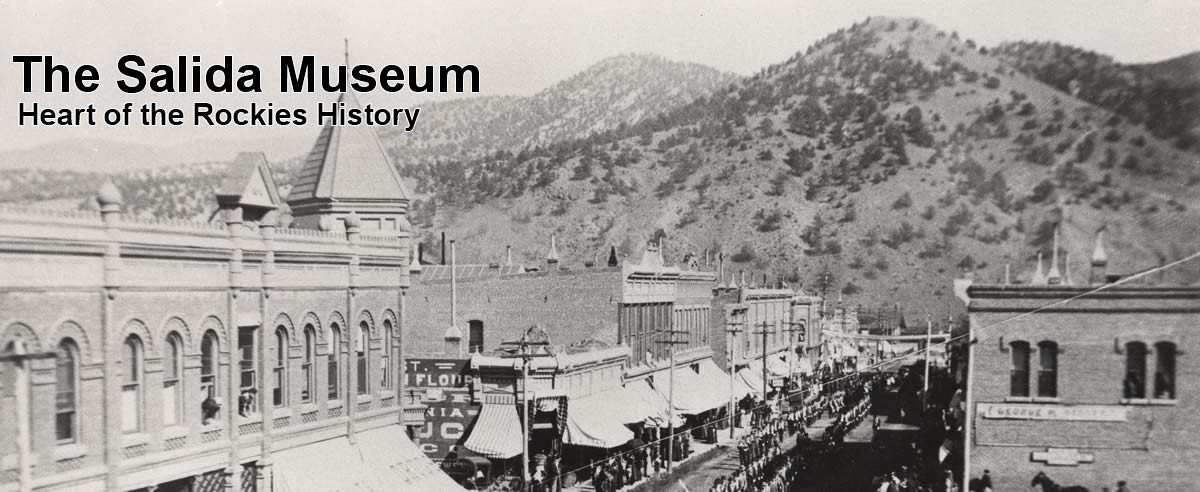WISHING YOU HEALTH AND SAFETY!
From the Board of Directors
Dear Salida Museum Friends and Family,
At this time, the Salida Museum has been closed for about seven months, unfortunately during our busy summer season. We are currently experiencing the predicted increase in COVID-19 cases in Chaffee County, and therefore we have no definite plan for re-opening. We have missed our contacts with out-of-town visitors and members of our community, who invariably bring their own stories to add to our historical perspective.
That is not to say that the museum has been idle. Thanks to our wonderful volunteers, we have continued with the work of accepting new donations, creating new exhibits, researching and responding to the questions received on our website, and cataloging the seemingly unending supply of new treasures found in the storage bins. Thank you, volunteers, for your continued support and help with our efforts to tell the story of Salida and the Upper Arkansas River Valley through our exhibits at the museum.
When the pandemic has resolved itself, however that may be, we hope to follow a phased approach to reopening, stressing safety first, for our volunteers as well as our visitors. We will continue to offer our unique experience of the Salida area history and give our visitors a fun and educational experience.
As our President said in our last newsletter, “In the weeks ahead, as we continue to navigate this new normal together, I know we will all be able to find hope and inspiration through history. Together.”
Sincerely,
Bob Campbell, Earle Kittleman, Judith Kinzie, Bonnie Konopka, Arlene Shovald, Larry Kovacic
Salida Heritage Days 2020 Cancelled
The second annual Salida Heritage Days was scheduled to take place October 2-4, 2020, celebrating 140 years of Salida history. The festival has been cancelled for safety reasons due to the COVID-19 Pandemic. More information will be available as the situation progresses and plans are finalized for future rescheduling. Updated information can be viewed at www.salidaheritagedays.com.
Plan File Cabinet Donated
Linda Inge has donated to the museum a set of two plan file drawer cabinets that were being sold after her husband, Bob, retired early in 2020 from his artifact preservation business and then passed away several months later. Bob and Linda operated Inge Preservations, a paper artifact restoration business, and had done work for the museum in the past. This generous donation will allow us to store large flat items that are currently sitting on a shelf while not being on display. Many thanks to Linda for helping us more adequately preserve our stored artifacts.
Elmo Bevington Exhibit
Board Member Bonnie Konopka has designed a new exhibit in the museum displaying artifacts that showcase the activities of Elmo Bevington in the Salida area. In the 1950’s Elmo was primarily a brewery owner in the Midwest when he began visiting family in Colorado and made several investments locally. He eventually bought the town of Garfield, started a tourist attraction on Monarch Pass, and then bought Monarch Ski Area in 1967. From there he went on to start many businesses in Salida and was a member of most local service organizations. The Bevington Exhibit gives the visitor a good feeling for Elmo’s significant contributions to the Salida business community as well as his impact on the growth of our local area.
Coming Soon
Steve Chapman, author of books on early Salida history, has written two new additions to his historical series, increasing the total to four books featuring Salida Sam as narrator of events in early-day Salda. The two new books are Three Murdered Wives–The History of Salida, Colorado, 1884-1885 and Salida Burns Down–The History of Salida, Colorado, 1886-1887. These books will be available November 14, 2020, and all four of his books can be ordered online at www.SalidaWalkingTours.com/shop.
Library Corner
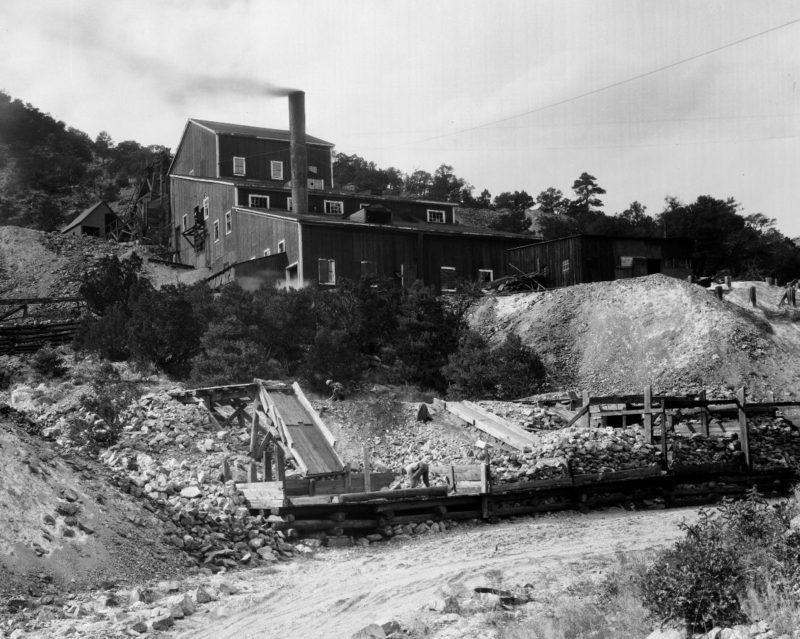
Smeltertown
The Sedalia Mine, located west of Salida off of Highway 291, was a huge copper producer. It was discovered in the 1890s and by the end of that decade, had reportedly pulled out 4 million pounds of metallic copper. The success of another copper producer, the Copper Star Mining Company, located two miles NW of Salida in Dead Horse Gulch, necessitated the need for a local smelter.

The Ohio and Colorado Smelting and Refining Company opened their lead-zinc smelter in 1902 and Smeltertown was born. Also known as Kortz town (named for the president of the smelter company), it was located just below the smelter operation, and it was a rough place, murders being a a frequent occurrence. By 1904, it boasted no less than five saloons. In 1910, police officer Jake Pate was murdered, quite viciously, when his throat was slashed multiple times by a local brawler. The murder of Pate forced Salida’s hand into revoking all the liquor licenses.
The smelter operated until 1919 and was sold at auction in 1920. The new owner stripped the entire area of metal and brick and then leased it to Trinchera Timber Company in 1924.
“A portion of the former smelter site, including the smelter office building, was used by a series of railroad tie-treating companies (Koppers and its predecessors), beginning in 1926. The treating operations included a pressure treating retort, drip racks, storage tanks, pole plant, and lagoons. In the retort building, railroad ties and other lumber products were pressure-treated with creosote in steel cylinders.” (EPA’s Third Five-Year Review)
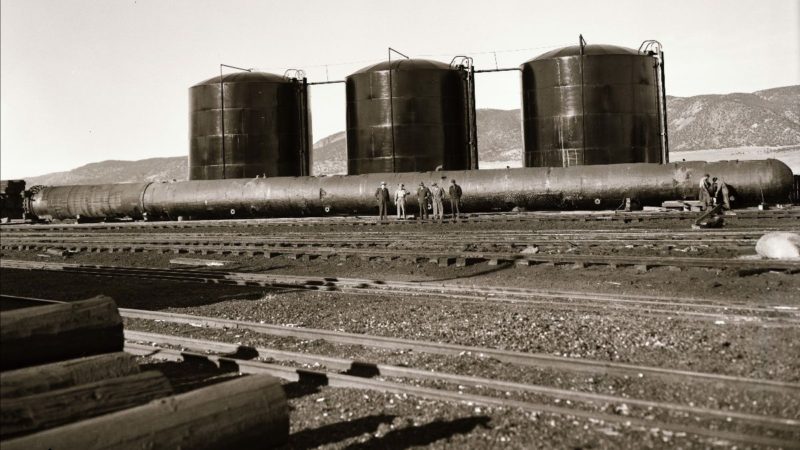
The railroad ties were placed in these vacuum-sealed cylinders where the air and water were forced out. The above cylinder is newly-delivered and its size is not out of the norm; these cylinders could be as long as 150 ft. The railroad ties were treated with creosote, a coal-tar distillate, to make them less susceptible to rot and insect damage. This method extended the life of the tie in excess of thirty years.
The molten slag and waste was disposed along the banks of the Arkansas, just south of the smokestack.
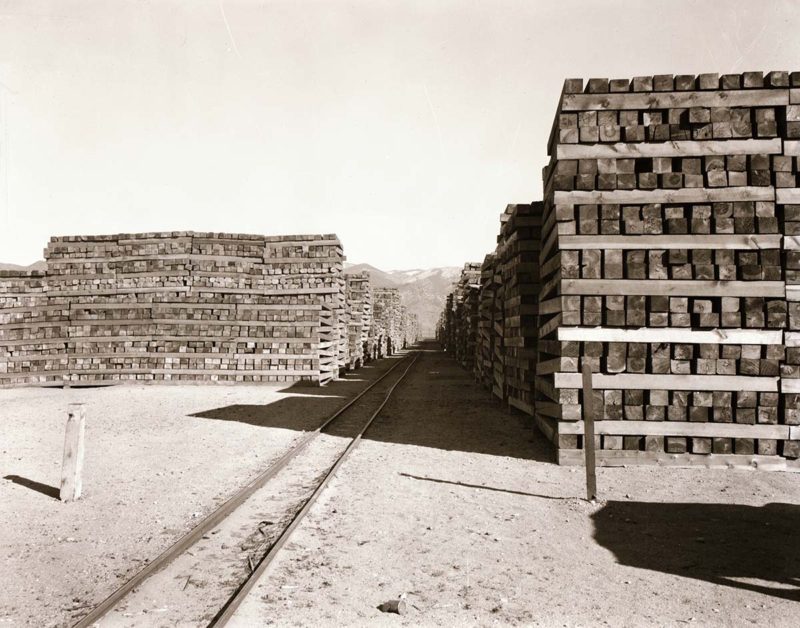
In 1953, wood treating production ceased at Smeltertown. The property changed hands several times before becoming a sand and gravel mine owned by Butala in 1965.
During the 1990s, Smeltertown became a Superfund site and a concerted effort was made to remove creosote-contaminated soils. The EPA worked with local land owners to mitigate the effects of the coal-tar creosote that was used in treating the railroad ties and is today a known carcinogen. Arsenic and lead were both found as leading contaminants in the Smeltertown soil.
Today, the soil is tested regularly and fencing and barriers are in place to keep the public off Smeltertown grounds.
– Joy Jackson is desk clerk and archivist at Salida Regional Library. She is in the process of curating the Salida Museum Negatives Collection and making them available online at the library website. Follow twitter.com/SalidaArchive to see historic images of Salida.
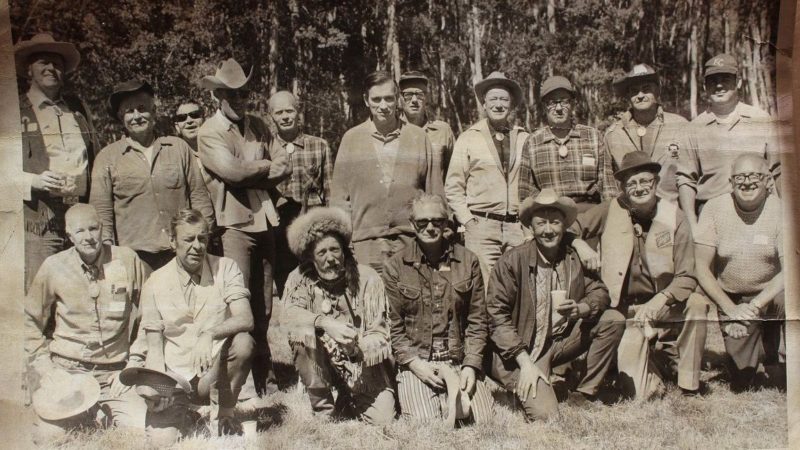
By Arlene Shovald
Back in 1966 a group of Salida men, Elmo Bevington among them, founded the International Order of Rocky Mountain Goats (IORMG). The purpose of the organization was to preserve the Rocky Mountain Goat and for several years the group funded scholarships for young people whose college studies were related to preserving the habitat and other aspects of the Rocky Mountain Goat population.
The annual meeting of the IORMG, called a “wadi,” was held on Elmo Bevington’s 160 acre Lake Ranch on Mt. Shavano. Wadi is a name for a gathering of goats. Plans were to make Mt. Shavano and the surroundings a wilderness area and to establish a breeding place for the goats. Eventually the IORMG attracted members from all over the country and was a bastion of male exclusivity with “no girls allowed.” Also no guns were allowed. Elmo Bevington was on the Board of Directors. Other members were Bill Burtness, Jack Wolfe, Stan Ogilvie, W.E. Patterson, Lou Flower, George Oyler, Bob Nevens, Steve Frazee and George Koenig Jr.
That first year, in 1966, the group accepted responsibility for the seven head of buffalo Elmo had purchased as another of his tourist attraction ideas.
About 90 people attended the first Wadi. One of the attractions of that gathering was a helicopter ride that took the two-legged goats aloft to observe the four-legged goats in their mountain habitat.
That first Wadi was well attended by reporters from many Colorado towns as well as the Associated Press and brought notoriety to the group. New members were called “tender lovin’ kids” and they increased the membership to 300 in a relatively short time.
A photo (above) of one of the early Wadis (possibly the first one) from the George Oyler collection pictures some of those early members. Oyler was publisher of The Mountain Mail newspaper from 1951 to 1971. Unfortunately not all of the men can be identified. Those we can ID are front row, from left, George Dominick, Dr. Ted Riley, Kenny Englert, George Oyler, Stan Ogilvie, Elmo Bevington, ??. Back row, from left, ??, Louis Coutu, ??, Fritz Rundell, next three unidentified, Jimmy McCormick, ??, Lloyd Swedin, Bob Bevington, ??. Anyone who can help us identify the unknowns can call Arlene Shovald at 719-539-3139 or email arlenephd@yahoo.com.
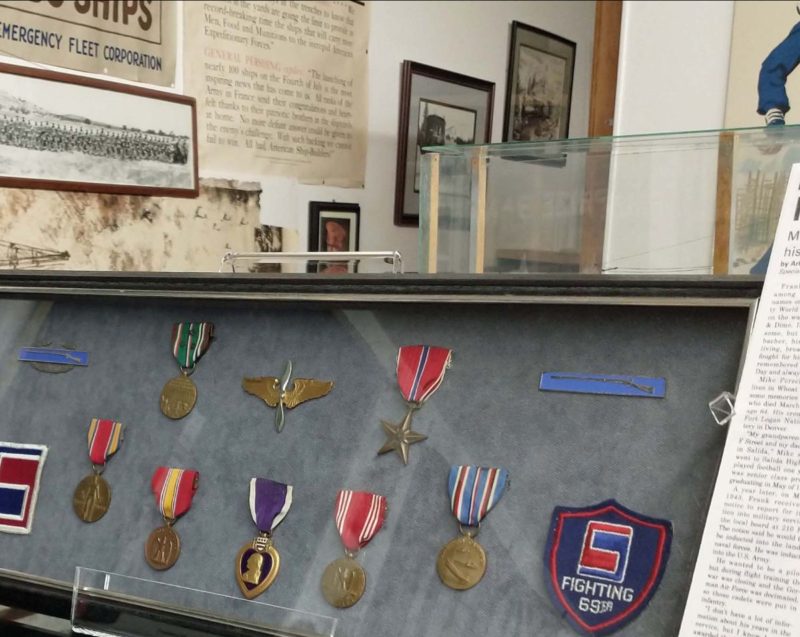
World War II Hero Remembered
By Earle Kittleman
Salida native Frank C. Perschbacher was wounded and cited for bravery while serving in “the fighting” 69th Infantry Division in the Rhineland Campaign in Europe as WWII was coming to an end. Frank graduated high school in 1942 as class president shortly before being drafted. He returned here from overseas to convalesce and raise a family and then got a business degree at Denver University.
Now his Bronze Star, Purple Heart and other uniform insignia are displayed in the military section of the museum thanks to his son Michael, of Wheaton. Michael, himself a Vietnam vet, drove here in July to make the donation. Also on display is the telegram saying Frank had been wounded and a commemorative book about the exploits of the 69th Infantry in Europe.
Mike said his dad loved Salida, especially the fishing and hunting. The family later lived in the Denver area where Frank worked for many years as a bank vice president. Frank died March 11, 1987 at age 64.
It is interesting to note that, so far as we could determine, Michael and his father are no relation to the current Salida Perschbachers.
Museum Board of Directors
The current museum board of directors is comprised of the following:
President, Bob Campbell
Secretary, Earle Kittleman, 719-539-6153
Treasurer, Larry Kovacic, 505-280-4831
Board Member, Judith Kinzie, 719-539-9439
Board Member, Arlene Shovald, 719-539-3139
Board Member, Bonnie Konopka, 505-270-6523
Special thanks goes to Margaret Dean, who volunteers as a board liason from Maysville. The members of the South Arkansas Landowners Association (SALA), comprising residents in the Maysville area, do a lot of work taking care of the historic Maysville School, which is owned by the museum. We appreciate their efforts to maintain the school as a historic landmark and look forward to a long and fruitful relationship.
If you are interested in becoming a board member and coming to one meeting a month (minimal commitment, no summer meetings), let us know. We would be very happy to talk to you about joining our team. Our board meetings are open to the public, so if you want to attend one and find out if you’re interested, the meetings are the third Wednesday of the month, 11:00am, at the museum. Note: meetings are currently cancelled for safety reasons, but will resume as soon as we feel safe in doing so.
Support the Salida Museum
The Salida Museum Association is an all-volunteer non-profit organization that relies on donations, memberships, admissions and limited fundraising to remain operational. You can help support the museum by making a donation or becoming a member.
Donation – any amount appreciated
Annual Membership – $15, includes 5 free visits
Lifetime Membership – $100, includes unlimited free visits
Memberships and donations are tax deductible. Send your payment to the address listed below, use our website to remit with PayPal, or join when you come in to see the museum. You will receive an acknowledgement letter for tax purposes. (make sure we have your address)
Salida Museum Association
406 1/2 W. Hwy 50, Salida, Colorado 81201
salidamuseum@gmail.com
719-539-7483
For more museum information, see our website or Facebook page.
Note: You’ve been included on the list because you are a member, left your email in our visitor log book or asked to added. We promise we won’t overstuff your inbox, but if you decide you want to unsubscribe you can do so below.
